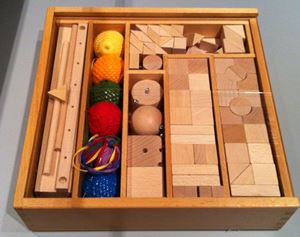Why Play Games?
Games are not just fun, they help us get better at thinking and planning.
People like games because they make learning feel good. This helps us get ready for life's challenges. Games are fun for a good evolutionary reason.
In math class, we use a set plan, but we also know that everyone likes different things. Games can help you find what you love and get good at it.
The famous architect Frank Lloyd Wright played with blocks like these when he was little:

Later, he created beautiful houses, such as Fallingwater:

Kinds of Games for Learning
Mathematics is about many things. Numbers, Space, Data, Measurement, Money and more.
We don't know which way the students life will go, so perhaps give them some time every day to let them develop in their own way. Let their enjoyment be their guide!
So we have the classic games such as Chess, Checkers, Go, Gomoku, Reversi, etc to make you think ahead and plan your moves.
And puzzle games such as Sudoku, Sokoban, Mahjong, Marbles, Master Detective, for good brain exercise!
Number games like Proximity, Speed Math, Jugs, Make the Amount,
Mental games like Bulls and Cows, Battleship, Math Match, Simon Says
Geometry puzzles like Follow the Direction, 3D Maze, Plumber
And there are games like Tanks that teach you about angles and money when you play.
We have these games because they really teach you something. Let us know what you think by contacting us!
References
- Games as a tool for thinking and planning: Gee, J. P. (2003). What video games have to teach us about learning and literacy. Palgrave Macmillan.
- Evolutionary reasons for fun in games and learning:Pink, D. H. (2009). Drive: The surprising truth about what motivates us. Riverhead Books.
- Frank Lloyd Wright and the influence of Froebel blocks: Botar, O. (1998). Frank Lloyd Wright and Froebel Gifts. Frank Lloyd Wright Quarterly, 9(4).
- Mathematical games and learning: Devlin, K. (2011). Mathematics education for a new era: Video games as a medium for learning. CRC Press.
- The value of classic strategy games (Chess, Go, etc.) in developing planning skills: Burgun, K. (2012). Game design theory: A new philosophy for understanding games. CRC Press.
- Puzzle games as brain exercise: Anderson, M. et al. (2018). Cognitive training and brain games. Frontiers in Psychology.